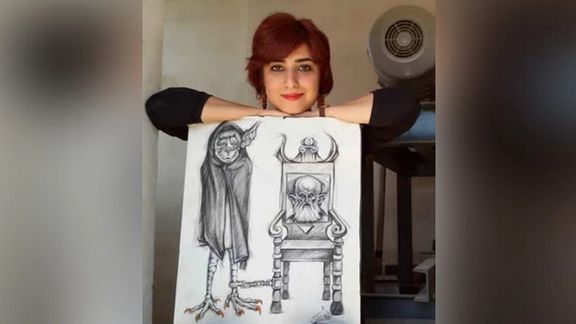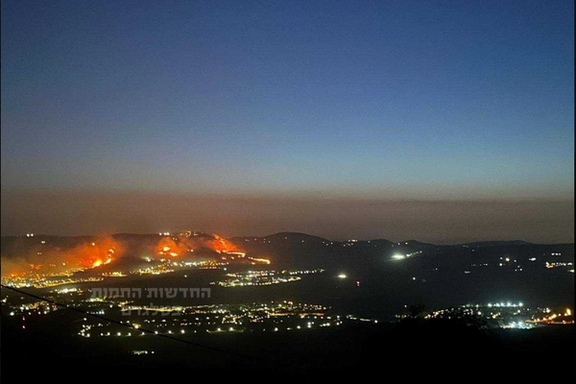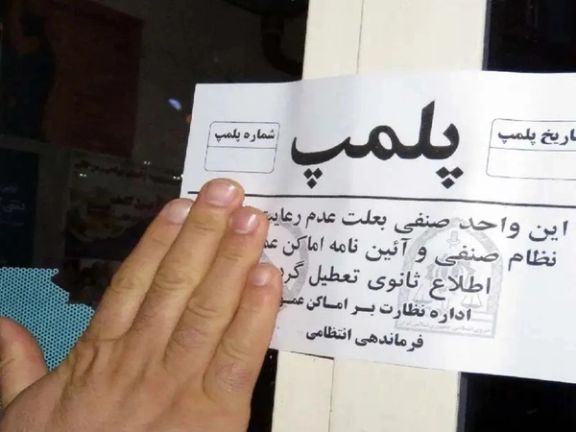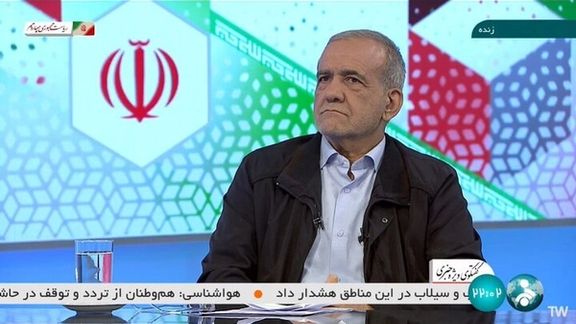Iran Imprisons Cartoonist for Six Years

The Revolutionary Court of Tehran has handed down a six-year prison sentence to Atena Farghadani, a cartoonist targeted for her critique of the government.

The Revolutionary Court of Tehran has handed down a six-year prison sentence to Atena Farghadani, a cartoonist targeted for her critique of the government.
According to her attorney, Mohammad Moqimi, Farghadani has been behind bars since her arrest on April 13, charged with “insulting sacred values and propagating against the ruling system". Farghadani received five years for the former and an additional year for the latter. Moqimi blasted the proceedings as a "sham trial" in a post on the X, denouncing the judiciary's manipulation of charges to secure the harshest possible sentence.
Farghadani came to a head when she was seized by security forces while attempting to display her artwork on a street wall outside Supreme Leader Ali Khamenei’s compound in response to the suppression of her art exhibition and the continuous harassment by security personnel.
Post-arrest, she was subjected to torture in a Revolutionary Guard-operated safe house, before being transferred to Evin prison.
Her imprisonment has drawn criticism from global human rights entities, including PEN America, Cartooning for Peace, and the Cartoonists Rights Network International, which have collectively decried her arrest and the punitive actions against her, urging for her immediate release.
The crackdown on artists has worsened since the 2022 uprising with some even receiving the death penalty, as seen in the recent case of Toomaj Salehi, a dissident rapper who is now on death row.

Northern Israeli residents who face daily attacks from Iran-backed Hezbollah say their lives have turned into "hell", and view the Islamic Republic of Iran as responsible.
Hezbollah launched anti-aircraft missiles at Israeli fighter jets over southern Lebanon on Sunday, according to the Israel Defense Forces (IDF), as cross-border skirmishes between Israel and the Iran-backed terror organization intensify.
Incoming rocket alerts were also activated in the northern coastal region of Acre overnight Monday, the IDF said in a statement.
The drones and anti-tank missiles launched caused fires and damaged buildings in northern Israel. This came just a week after Hezbollah rockets sparked days of wildfires in northern Israel, with a forest reserve destroyed and at least 11 people hospitalized for smoke inhalation.
Since October 7, clashes between Israel and Lebanon have escalated, with 150,000 people on both sides of the boundary forced to flee their homes. Recent attacks have increased the fears of full-scale war.
For Northerners in Israel, everyday life is a battle, Israeli resident Ofri Eliyahu Rimoni told Iran International. "Life is a living hell' for people of the North," she told Iran International.
"Alarms four or five times a day, telling us to go to shelters to stay there. A lot of people was displaced from their homes and the people who didn't get displaced from their homes, they are right now living in a war zone. Literally a war zone," she said.
She said agriculture is the main industry in the region and the wildfires set off by Hezbollah attacks are devastating the local economy as people risk their lives just to work in the fields.
"Your whole life burning down. It's burning my heart," said Rimoni.
Israeli Prime Minister Benjamin Netanyahu threatened further military action after the onslaught of Hezbollah attacks in the North.
While touring the damage from the fires in the northern city of Kiryat Shmona last week, Netanyahu said that Israel was preparing for “very intense action in the north.”
“One way or another, we will restore security to the north,” Netanyahu said.
60,000 people, who previously called the North their home, are living in hotel rooms scattered across Israel.
On June 5, at least 11 people from a Druze Arab village of Hurfeish in northern Israel were injured after Hezbollah launched an armed drone attack. One person was reportedly in critical condition after the exploding drones crashed into a soccer field. 39-year-old First Sergeant (res.) Refael Kauders was killed.
On Telegram, Hezbollah took credit for the attack, claiming the attack was in response to an Israeli strike on June 4 that killed a Hezbollah operative in the southern Lebanese town of Naqoura.
Mufid Mari, a former Knesset member and retired IDF Colonel is from the Druze village of Hurfeish that was hit. He said life is not normal, with tourism at a standstill in the north and the Hezbollah attacks impacting factories and day-to-day life.
Mari said Druze villages are especially vulnerable to Hezbollah attacks because 40 percent of their homes are old and are not equipped with safe houses to protect them against rockets. When the sirens sound, the goal is to move as quickly as possible, in a matter of seconds, to the safe room.
"All of us in the Middle East, we want and need to be living in peace," said Mari.
Mari said the daily attacks are intolerable and he believes they need to get ready for a large-scale war with the Iran-backed proxy.
Israeli security expert Sarit Zehavi said Northerners in Israel are expecting a Hamas-style attack in the region. Zehavi said more than a decade ago, Hezbollah published its offensive plan for an attack on Israel - and she described its similarity to what Hamas did to southern Israel as “astonishing.”
The anticipated attack hasn't happened yet, she believes, because tens of thousands of residents have already evacuated. She said most of the attacks are in evacuated areas, but in the recent weeks there were more attacks on areas which are further from the border with Lebanon.
"These are exactly the areas that the UAVs and the anti-tank in the rockets aim to and this is every day," said Zehavi.
Zehavi, who served 15 years as an intelligence officer in the IDF said "the evacuated towns have no prospect when they will be able to come home. They just don't know how this is going to play out. And it's so sad to see the beautiful valley empty like this."
Zehavi said all roads lead to Iran.
The founder of the Alma Research Center which monitors and disseminates information on the threats faced in the North, referred to Iran as the 'engineer' and the 'architect' behind everything happening.
"This is all part of the same campaign under the title 'unification of fronts.' The idea of unification of fronts is to create a multi-front campaign against the State of Israel by these proxies."
It is widely believed that Iran supports Hamas with $1 billion a year. The Islamic Republic also supports Palestinian Islamic Jihad with tens of millions and is providing Hezbollah with 70 per cent of its budget - and its ideology.
Hezbollah opened a battle front with Israel on Oct. 8, a day after the deadly Hamas attacks in Israel.
While the US and France have been trying to find a diplomatic solution to the conflict, Northerners in Israel say they just want to have their lives back.

Iranian law enforcement agencies have recently widened their crackdown on cafes secretly serving alcohol to customers, with two cafes in Tehran province sealed by authorities in the last week.
State-affiliated media quoted Amir Ahmadi, the Public Prosecutor of Baharestan County, in Tehran province, announcing that two cafes were sealed after being identified for serving alcoholic beverages.
Selling, possession and drinking alcohol by Muslims was prohibited in Iran after the establishment of the Islamic Republic in 1979. During the monarchy alcoholic beverages were unrestricted, subject to certain regulations.
IRGC-affiliated Tasnim News Agency on Sunday quoted Ahmadi as saying, "A cafe in the city of Salehieh that served alcoholic beverages at the premises was sealed. The cafe owner and two of the customers of the cafe were arrested."
Ahmadi further stated that arrests were made in addition to the cafe being sealed.
“The operator of the cafe and two of the customers were arrested,” he added.
He also warned that all cafes in Baharestan County are being closely "monitored" and "must comply with Sharia law."
"We will not allow alcohol to be served in public places and cafes in the city under any circumstances," Ahmadi stated. "If we find any violations, decisive action will be taken against the operators, as demonstrated by the recent closures of cafes for serving alcohol."
The increased crackdown on alcohol consumption coincides with government efforts to enforce hijab rules
Additionally, on May 15, Asghar Jahangir, Iran’s judiciary spokesperson announced the arrest of a garden owner accused of producing homemade alcohol that poisoned some people. The garden was subsequently sealed, according to Entekhab News.
He added that 24 people were present at this gathering of which 6 were poisoned and 1 died as a result of consuming counterfeit alcohol.
Moreover, last year in July, Mohammad Yousefvand the Public and Revolutionary Prosecutor of Robat Karim County, Tehran Province, announced that five cafes had been sealed and four individuals were arrested. Yousefvand further stated that 6 individuals were killed as a result of consuming bootleg alcohol, and 22 people were poisoned in Robat Karim.
Individuals who breach the ban on alcohol are punished with lashings and monetary penalties. For those who distribute alcohol, the penalties are even higher with the possibility of capital punishment. In September last year, four men were sentenced to death for their involvement in counterfeit alcohol distribution which allegedly led to the death of 17 individuals.
Despite the ban and the recent heightened crackdown by authorities on cafes, shops, parties, and gatherings where alcohol is served or sold, Iranians continue to consume alcohol.
A survey by Iran Open Data in 2021 found that half of all adults in Iran regularly drink alcohol with homemade alcohol being the preferred choice.
Furthermore, a survey by World Health Organization in 2018, placed Iran in the 9th ranked among 189 countries for alcohol consumption per capita.
With bootleg alcohol consumption on the rise in Iran, some critics believe that hardliners are involved in widespread alcohol poisoning as they believe those who consume alcohol must be punished.
Nevertheless, with alcohol consumption unregulated and prohibited, Iranians lack safety measures for responsible drinking, leaving them vulnerable to the dangers of counterfeit alcohol which include poisoning, blindness, and death.

Iran’s state TV began its programs introducing the six handpicked presidential candidates on Monday, airing recorded interviews with each candidate before four-hour TV debates take place starting next week.
The interviews with Masoud Pezeshkian and Parliament Speaker Mohammad-Bagher Ghalibaf took place on Monday and were focused on the economy and other issues without any reference to foreign policy, the nuclear issue, or hijab.
In his first interview with the news channel Monday evening, Pezeshkian, the only approved ‘reform’ candidate referred to the “divide between the people and the government” as a major issue.
Pezeshkian stressed that his government would not introduce any new economic strategies and policies. Instead, he said, it will try to efficiently implement the existing development plan by reforming the administrative system, making it transparent and accountable.
Pezeshkian criticized the lack of justice in distribution of wealth and resources among the country’s provinces and stressed the importance of improving the lives of civil servants, relying on experts and the elite personnel, improving and stabilizing the environment for domestic and international investment for a desirable level of economic growth.
However, the issue in Iran is not only fair distribution but lack of resources to distribute. The country’s bombastic foreign policy and its expanding nuclear program have impeded oil exports, foreign trade, technology and investments.
Pezeshkian, 69, is running against five hardliners including “neo-conservative” Parliament Speaker Mohammad-Bagher Ghalibaf and former nuclear negotiator Saeed Jalili.
The outspoken cardiac surgeon, served as health minister under reformist Mohammad Khatami and has been elected five times as representative of Tabriz, capital of the East Azarbaijan Province since 2007. He was deputy speaker from 2016 to 2020.
Spokesman of the Reforms Front, Javad Emam, in a statement Sunday expressed regret over the disqualification of the Front’s two other candidates, Abbas Akhundi and former Vice-President Es’haq Jahangiri, as well as candidates of other political groups and confirmed that the Front would be supporting Pezeshkian as its candidate.
The Reforms Front had insisted it would not participate in the elections if none of its three proposed candidates were allowed to run. The Front’s leader, former President Mohammad Khatami, abstained from voting in the parliamentary elections in March to protest the extensive disqualification of ‘reformist’ candidates by the un-elected watchdog, the Guardian Council.
In a short statement Monday, Jahangiri who also registered to run but was barred by the Guardian Council announced his full support for Pezeshkian as the Reforms Front’s candidate.
In a tweet Monday, however, former Vice-President Mohammad-Ali Abtahi warned about too much optimism over Pezeshkian’s chances of being elected based on the increasing attention he is gaining on social media. “Social media only reflects [the views] of a small part of the society. Candidates and their supporters shouldn’t be misled by the social media,” he tweeted.
Journalist and political commentator Ahmad Zeydabadi opined in an interview that for Pezeshkian to succeed, he must become a symbol of change for the younger generation like the leader of the Green Movement Mir-Hossein Mousavi in the 2009 elections.“Two things matter to those who want to vote: what direction are [the candidate’s] plans and how feasible their execution is given the existing structures,” he wrote.
“Mr. Pezshkian has high influence among ethnic groups,” Zeydabadi said, adding that not only the Turki-speaking population but also the Kurds and other ethnic minorities may go to the ballots to vote for him. According to Zeydabadi Pezeshkian’s chances of being elected is good but “what happens after he is elected” that worries him.
Pezeshkian is the front-runner in an online poll by Tabnak, a conservative news website close to the secretary of the Expediency Council, Mohsen Rezaei, with 67 percent of the 16,500 votes Monday. In the same poll, Ghalibaf and Jalili both have less than 13 percent of the votes.

Reuters - Israel has intensified covert strikes in Syria against weapons sites, supply routes and Iranian-linked commanders, seven regional officials and diplomats told Reuters, ahead of a threatened full-scale assault on Tehran's key ally Hezbollah in Lebanon.
Israel has intensified covert strikes in Syria against weapons sites, supply routes and Iranian-linked commanders, seven regional officials and diplomats said, ahead of a threatened full-scale assault on Tehran's key ally Hezbollah in Lebanon.
A June 2 air raid that killed 18 people, including an adviser with Iran's elite Revolutionary Guards, targeted a clandestine, fortified weapons site near Aleppo, three of the sources said. In May, an air strike hit a convoy of trucks headed to Lebanon carrying missile parts and another raid killed Hezbollah operatives, four said.
Israel has for years struck militant groups backed by arch-foe Iran in Syria and elsewhere, in a low-level campaign that burst into open confrontation after Israel and Palestinian group Hamas - another Iranian ally - went to war in Gaza on Oct. 7.
Israel has since killed dozens of Revolutionary Guards (IRGC) and Hezbollah officers in Syria, from just two last year before the Oct. 7 attack, according to a tally by the Washington Institute for Near East Policy, a think tank.
The battle hit fever pitch in April when Israel bombed the Iranian consulate in Damascus, killing the top IRGC commander for operations in the Levant. In retaliation, Iran fired some 300 missiles and drones at Israel, almost all of which were shot down. Israel then attacked Iranian territory with drones.
This direct confrontation, a first for the two countries, stopped there. Israel also briefly reduced the number of strikes it was carrying out against Iranian proxies, said Selin Uysal, a French diplomat seconded to the Washington Institute, citing the tally, which counted publicly-known attacks in the weeks immediately before and after.
"There was a slowdown" after the face-off in April, she said.
"But they are picking up again because of suspected Iranian weapons transfers to Lebanon. There is a kinetic effort in Syria and Lebanon to disrupt the supply chain between Iran and Hezbollah."
Reuters interviewed three Syrian officials, an Israeli government official and three Western diplomats about Israel's Syria campaign. The officials asked not to be named to talk freely about sensitive matters.
The Syrian officials gave previously unreported details of the targets of Israeli strikes around the cities of Aleppo and Homs in recent months, including the June 2 attack.
All those interviewed said Israel's moves suggested it was gearing up for a full-scale war against Hezbollah in Lebanon, which borders Syria, that could begin when Israel dials down its campaign in Gaza.
"The statements of our leaders have been clear that escalation could be imminent in Lebanon," the Israeli government official said.
Israeli Prime Minister Benjamin Netanyahu said last week that his country was prepared for "very strong action" at its frontier with Lebanon, where it has been fighting a so-far limited battle with Hezbollah since October 8.
War in Lebanon is not inevitable. Israel has also indicated openness to diplomatic efforts being brokered by Washington and France. The Israeli government official said the campaign in Syria was also aimed at weakening Hezbollah and thus discouraging it from a war with Israel.
The Israeli government and military did not respond to questions for this article. Israel rarely publicly acknowledges targeted killings overseas and has not commented on the recent strikes in Syria. A senior Israeli official said last year Israel was determined to prevent Syria becoming part of a new front.
The IRGC and a Syrian government spokesperson did not respond. Hezbollah declined to comment.
KILLING COMMANDERS, STRIKING SUPPLIES
Syria, a longtime Iranian ally, became the key conduit for Tehran's arms supplies to Hezbollah after Iran deployed military personnel and thousands of allied paramilitaries from around 2013 to help President Bashar al-Assad during his country's ongoing civil war.
Some weapons parts are smuggled into Syria while others are assembled there, the three Syrian officials said.
Israel's Syria campaign aims to make sure Hezbollah, Iran's most loyal ally and the linchpin of Tehran's projection of regional power through militant proxies, is as weak as possible before any kind of fight begins, the Syrian officials and Israeli official said.
The June 2 killing of Saeed Abyar, described by Iranian state media as an IRGC adviser, showed Israel's reach in taking out key personnel and targeting equipment even when Iran has tried new methods of protecting weapons and parts bound for Hezbollah, the Syrian officials said, including moving the manufacture of weapons to more hidden or fortified locations.
Abyar was visiting a manufacturing plant for missiles for Hezbollah that was hidden inside a stone quarry east of the city of Aleppo when he was hit, the Syrian officials said. "The facility was in an area designed to be hard to find and hard to hit," said one of the officials, an intelligence officer.
Iran blamed Sunday's strike on Israel and the head of the IRGC has vowed to retaliate.
The officials said the strike killed 17 other people, including Iran-aligned militiamen. It was the first targeting of an IRGC official since Israel bombed the Iranian consulate, they said.
But it is not the only attack it has carried out since then.
An air strike near the Syrian city of Homs on May 29 targeted a vehicle carrying parts for guided missiles from Syria to Lebanon, the Syrian intelligence officer said. Another strike on May 20 targeted members of Hezbollah, the officer said.
Before the Iran consulate attack, a series of air strikes in late March around Aleppo hit warehouses storing high explosives for missile warheads, the officer said.
Other attacks have targeted Syrian air defence systems that had in recent years given Hezbollah and Iranian military personnel some security to operate, including Russian-made Pantsir air defence systems, mobile missile launchers that the Syrian military uses, a Syrian military official said. Other strikes had targeted early-warning radar systems, the official said.
"In some cases Israel is hitting even before we install our equipment," the official said.
The Israeli government official said Israel's targets were advanced anti-aircraft weapons, heavy rockets and precision-guidance systems for missiles.
ISRAEL TIPPING THE BALANCE?
The number of Israeli attacks in Syria jumped dramatically after October 7, when Israel and Hamas went to war.
"The frequency has doubled," said the Washington Institute's Uysal.
Israel carried out 50 air strikes in Syria in the six months after the Gaza war began, she said. "These included attacks on Aleppo airport, the Nairab military airport, Damascus airport, and the Mezzeh military airport, which are key in weapon transfers. Weapons caches were also among the targets."
The strikes have included the killing of some 20 IRGC officials and more than 30 Hezbollah commanders, Uysal said. Between January and October of 2023, two IRGC officials and no Hezbollah commanders were killed by Israeli strikes in Syria, Uysal said.
"The attacks in Syria certainly stop arms and ammunition deliveries and damage the ability of Hezbollah or Iran to organise," said Lior Akerman of Reichman University, a former Brigadier-General in Israel's domestic security service.
Iran sends limited numbers of advisers to Syria, such as the senior IRGC officials killed in the consulate bombing. Hezbollah has deployed thousands of fighters there.
Hezbollah official Nawaf Musawi told the Iran-aligned Al Mayadeen TV channel in March that the group was opening new ammunition depots "and getting more precision missiles and better quality weapons by land, sea and air."
Farzan Sabet, a senior researcher at the Geneva Graduate Institute who specialises in Iranian foreign policy, said attacks on Israel by Hezbollah and Iran's allies in Iraq and Yemen during the Gaza war had taken a toll on Israel.
"But it has killed many more Hezbollah operatives and senior figures including IRGC personnel in Syria, so on balance it's a bigger loss" for Iran's allies, Sabet said.
(Report by Reuters)

It has been revealed that subsidence risks in Khorasan Province are five times larger than other areas, making it one of the most significant subsidence regions in Iran.
Ali Beitollahi, the head of the Risk Section at the Research Center of the Ministry of Roads and Urban Development revealed in an interview with ILNA on Monday that "In Mashhad, the subsidence rate in the northwest of the city has reached 20 centimeters per year and will gradually affect the city center and the shrine of the eighth Shia Imam."
On May 1, Shargh newspaper published an article reporting that Tehran, Khorasan Razavi, and Isfahan provinces—home to the highest population densities in the country—are grappling with a land subsidence crisis.
An annual subsidence rate exceeding 10 percent is recorded in only three to five percent of subsidence areas worldwide. Comparing the statistics with the subsidence rates in Tehran, Khorasan Razavi, and Isfahan underscores the critical situation in these provinces.
Land subsidence, where the ground surface gradually sinks unevenly, typically occurs due to the depletion of underground resources such as water, oil, and gas, leading to the compression of soil layers. Excessive extraction of groundwater depletes aquifers, causing the soil layers, which were previously supported by water, to compress and sink. The process results in cracks in buildings, roads, bridges, and even extensive geographical changes, leading to significant infrastructural damage.
In such conditions, even months of continuous rainfall cannot restore the dried-up groundwater areas, a concerning situation for the residents of Mashhad, Tehran, Isfahan, and many other cities in Iran.